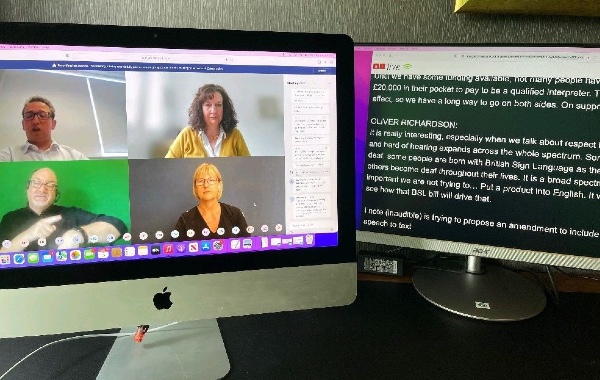
How many of your colleagues have hearing loss? You might be surprised by the answer.
On average it will be 1 in 6. But people who lose some hearing are often reluctant to mention it. There can be embarrassment and shame around ‘admitting’ that you are hard of hearing or deaf. So, you may not even be aware of colleagues who are struggling sometimes to access what is said at meetings and in discussions. Sadly this can lead to missing key information and colleagues feeling even worse about themselves. This is definitely something we should all help to avoid.
May 2-8 2022 is Deaf Awareness Week - a good time to reflect on how aware we are and what we can do to raise awareness.
On 3 May Jane took part in a ‘lunch and learn’ event for Deaf Awareness Week organised by Oliver Richardson, a Field Scientist for Thames Water, along with Lipspeaker UK, a specialist agency providing communication support. Oliver is, like Jane, profoundly deaf and has been having coaching sessions with Jane. The event was Oliver’s initiative and run jointly for Thames Water and the Institute of Water. Oliver ran an interview with Jane and Lesley Weatherson from Lipspeaker UK about their experiences of deafness, communication and support. Jane and Lesley then provided some exercises to allow the participants to try lipreading and explore its complexities.
Oliver highlighted the major milestone of the UK government’s BSL bill gaining Royal Assent. While marking its significance, giving BSL (British Sign Language) full status alongside e.g. Gaelic and Welsh, he noted that similar provision for English-using deaf people had been excluded and that this was a missed opportunity.
Jane raised the idea of a ‘deaf spectrum’ which, she said, could be more useful than binary notions of deafness which could be confusing and lead to stereotyping (e.g. ‘if you are deaf, you hear nothing at all and must use sign language’ – not necessarily!) and also ineffective communication support. You could use such a spectrum to identify your hearing level and the type of support or adjustments which help you most. In Jane’s case these are ‘hybrid’ – lipspeaking (repeating English lipreadably) with additional signs to support meaning and reduce the exhaustion which lipreading can cause. (Did you know that fewer than half of English words are lipreadable?).
There was a lively discussion at the event about how to encourage inclusion in the workplace. A great tip from one participant was that encouraging clear turn-taking at meetings, avoiding people talking at the same time, helps everyone, not just those with deafness.
Finally, if you are unsure what to do when you meet a deaf or hard of hearing person, ask! Treat each person as an individual and give yourself an opportunity to learn. You may be pleasantly surprised!
If you are interested in more information about coaching, including working with a deaf coach, get in touch.